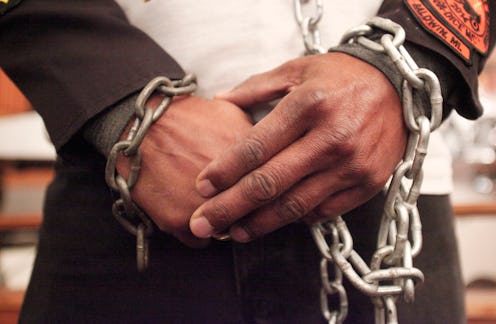News
Black Men Go To Prison Way Longer Than White Men Who Commit The Same Crimes

How the U.S. criminal justice system treats minorities has sparked a national dialogue and protests in recent years, and research continues to show that black men are given lengthier prison sentences than white men. According to the latest report from the U.S. Sentencing Commission (USSC), black male offenders were handed federal prison sentences that on average were nearly 20 percent longer than sentences for white male offenders who committed similar crimes.
Marc Mauer, executive director of the The Sentencing Project, a D.C.-based nonprofit promoting reforms in sentencing policy, says the report's findings are disturbing. "We have a system of justice that's supposed to be fair and equal and once again we see that African Americans are disadvantaged in how those policies play out in the real world," he tells Bustle.
The findings are based on sentences handed down from Oct. 1, 2011-Sept. 30, 2016 and they mirror the research that the commission conducted from 2007-2011. But in this most recent report, researchers also factored in offenders' criminal histories to determine whether their past offenses accounted for the racial disparity in sentencing. Spoiler alert: They did not.
While the public conversation regarding racial disparities in the criminal justice system has picked up in recent years, the USSC report reveals that the racial gap in sentencing has increased over the past two decades. As the Huffington Post points out, older reports from the commission show that between 1998 and 2003, the lengths of black male offenders' sentences were about 11 percent longer than white male offenders' sentences for similar crimes. That gap widened to 15 percent between 2005 and 2007, and nearly 20 percent in the years following.
According to Mauer, it's difficult to pinpoint just what is producing these disparities in sentencing. "In some respects, it starts early on in the justice system, at the level of law enforcement," he says. "We've seen that particularly in the drug war, where law enforcement focuses on low-income communities of color, which may or may not have higher rates of drug abuse but end up with higher rates of incarceration from that."
"...once again we see that African Americans are disadvantaged in how those policies play out in the real world."
But there are other factors as well. "Prosecutors are very powerful players in the court system, regarding what charges to bring," Mauer says. He adds that this can be especially problematic when it comes to mandatory minimum sentencing. Some criminal justice experts say that mandatory minimums, which are sentencing laws that mandate a length of prison term for certain federal and state crimes, can be cruel and unforgiving. Past research on mandatory sentencing and racial disparity backs up those claims, finding that prosecutors have the largest impact on sentences.
"We have sentencing policies that frequently impose far too much prison time for public safety purposes," Mauer says. "One thing we know about crimes is that individuals age out of high crime rate years." In other words, while crime rates rise for offenders who are in their late teens or early twenties, those rates fall soon after offenders age out of that group.
"So when we're locking people up for 10, 20, 30 years, they are often housed in prison long past the point where they are a harm to public safety," Mauer adds. "So we get real diminishing returns for that investment in to mass incarceration."
Mauer says there are a host of examples in our modern-day criminal justice system where punishments don't necessarily fit the crimes committed. By and large, he says, black men are disproportionately affected. "The drug war has relied on criminal justice approaches rather than public health approaches that could emphasize prevention and treatment much more heavily," Mauer tells Bustle. "Still, far too many people are serving time for drug offenses with not much good for public safety."
And while some changes are being made to emphasize treatment over jail or prison time for some non-violent offenders, Mauer says one root cause of the disparity is the system itself. While everyone in the United States has the right to legal counsel, the quality of defense lawyers isn't equal across the board — nor do all offenders have the same financial resources to post bail while awaiting trial, or to access treatment programs.
"In many respects," Mauer says, "we have a two-tier system of justice: one for those with adequate resources, who can prevent a very healthy defense, and another system that often always doesn't rise to the level of equal justice."